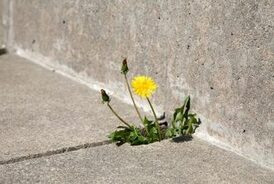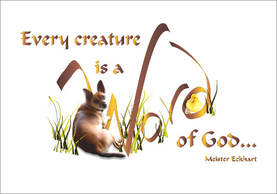

Hands up anyone who has learned something from living with, or observing, an animal, a bird or a plant?...
Which creatures have spoken to you?
Surely all of us have learned something from ‘the lilies of the field’ and ‘the birds of the air’, the plants and animals of our world. For, as a great Christian mystic (Meister Eckhart) once wrote, ‘every creature is a word of God.’ Every creature is part of God’s Creation and, even those we do not like very much (such as the biting and dangerous ones) has something to tell us about life and the nature of the one God, that creative mystery, in which we all share. Isn’t this what Jesus is saying in today’s Gospel? Certainly Jesus’ words challenge us to listen more deeply and to learn more fully from the other creatures, the flora and fauna, of our world. As we do, like that ‘bag lady’ I mentioned, we are led into a deeper sense of God’s grace and mystery.
How then can we look and listen properly? How can we better appreciate the other sentient creatures around us? Can we glean from them spiritual wisdom, as Jesus did? Or are we, like others, too inclined to regard them merely as background additions for our use or our entertainment? For we certainly live in an age when this contemplative challenge has become ever more important. Our modern world is often deeply unkind and inshopitable to animals in general. Yes, in some ways, as a race, human beings do love some other creatures quite well, but these are typically a handful of species we have turned into ‘pets’: animals such as dogs and budgies, and, to the extent they can be tamed, cats. Other species however do not fare quite so well. Scandalous numbers of animals and birds are needlessly destroyed or abused each year. Unnecessary extinctions of whole species continue to take place, as their numbers and habitats are undermined by human greed and ignorance. Modern so-called ‘civilisation’ exacts a terrible toll.
So what does God have to say on the matter?...
Well, we have heard from our Gospel today that God cares for the humblest bird and flower. When Jesus says ‘consider the lilies of the field’ and how they are clothed by God, or ‘consider the birds of the air’ and how they are fed by God, he is affirming how important they are to God. If human beings may be counted as especially important, this does not therefore reduce the value of other animals and plants. Rather it challenges us to share the same kind of care and compassion which God displays to us and all creation. This is the meaning of the gift of ‘dominion’ to human beings in the first chapter of the Bible, the first of all commandments God gives to human beings: to exercise divine stewardship of all creatures on Earth. What a difference it would make if we, as a human race, could live up to that calling!
We must of course be wary of sentimentality at this point. The other-than-human world would hardly be a paradise if human beings were withdrawn from it. Nature in all its guises is not only a place where God may be revealed. It is also ‘red in tooth and claw’, full of brokenness and violence which is not merely of human making. Anyone who loves cats for instance, must recognsie the capacity of other animals to inflict unnecessary pain. At the heart of much understandable atheism or agnosticism is also often a similar awareness, and protest against, the suffering which is such an inextricable part of Creation as a whole. Greater human kindness to animals will not change this. And yet…
The fundamental affirmation of the Bible is that Creation is ‘good’ and that God seeks to bring all things into perfect harmony. For, as we see from the beginning of the book of Genesis, all things are created to be in divine relationship with each other. The earth and the heavens, the animals and the plants, and, finally, human beings: all are created to live in partnership with one another, not exploitation. One of the deepest expressions of this is found in the book of Isaiah (chapter 11, verses 6 to 9), where the prophet speaks of God’s intent that ‘the wolf shall lie down with the lamb…. The nursing child shall play over the hole of the asp… (and, says God), they will not hurt or destroy on all my holy mountain; and the earth will be full of the knowledge of the Lord as the waters cover the sea.’
Wow! That is truly a ‘new Creation’ isn’t it?!
Indeed it is. For this is part of the messianic promise: the vision of the new Creation, which will come about, according to Isaiah, when the Messiah comes. Then, says, God in Luke’s Gospel (chapter 3, verse 6), ‘all flesh will see the salvation of God’: that is, all the violence in Creation will be ended, including the violence suffered and inflicted by animals on each other, as well as the violence humans suffer and inflict on others. The complete Messianic age may still be ahead of us but it has already begun in Jesus Christ.
So how are we doing with that? Are we living and working towards such a healing of Creation? If so, as a human race, we might be doing a good deal better in our attitudes and behaviour towards animals, and not just the domestic variety. We could be realising afresh that we ourselves are animals and are kith and kin with all other creatures, themselves valuable in the sight of God. We could be saying ‘no’ to unbridled development and the destruction of eco-systems upon which our fellow sentient creatures depend. We could be reconsidering the amount of meat we eat and certainly some of the methods of production. We could be dancing with joy, like St Francis, at rediscovering our intimate relationship with all the creatures he acknowledged as brother and sister.
‘Consider the liles of the field… the birds of the air… the beasts of the field’… This is not, as I say, about sentimentality, and it is certainly not about undermining our rural and farming communities. Rather, it is part and parcel of strengthening our commitment to those who exercise loving Christian stewardship of our land. For whether we live in city or country, it is about renewing our sense of God’s presence. It is about encouraging us all to walk more attentively in the ways of Jesus and the holy ‘bag lady’, and draw on the wisdom of God in our fellow creatures. For, as Meister Eckhart put it: ‘Find God in all things, for God is in all things. Every single creature is full of God and is a book about God. Every creature is a word of God. If I spent enough time with the tiniest creature – even a caterpillar – I would never have to prepare a sermon. So full of God is every creature.’ In the Name of the Son of God who became animal flesh to help point this out. Amen.
Josephine Inkpin for Flora and Fauna Sunday, 8 September 2019
 RSS Feed
RSS Feed